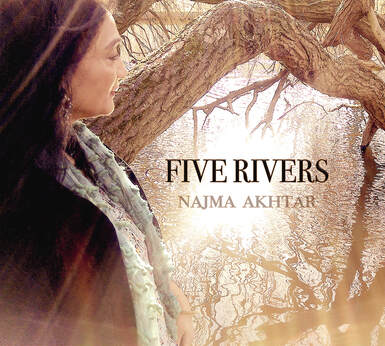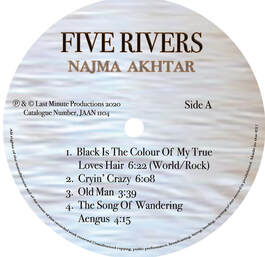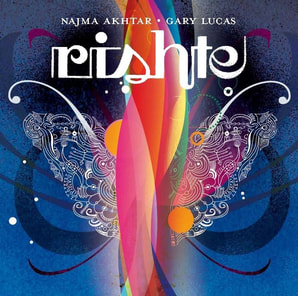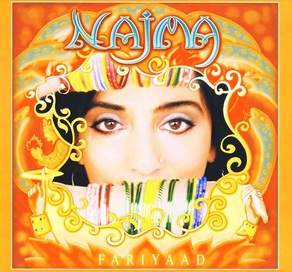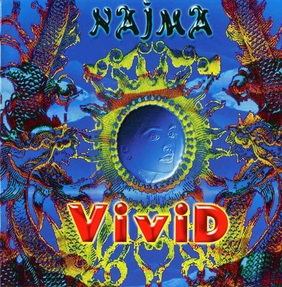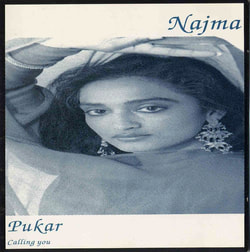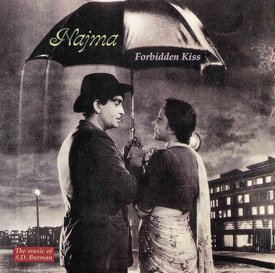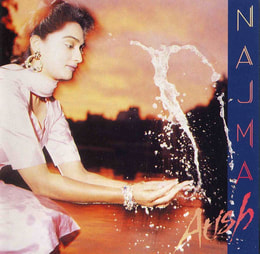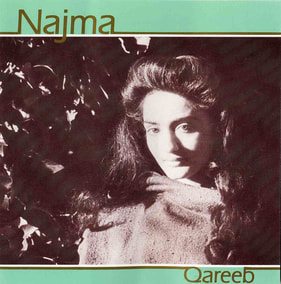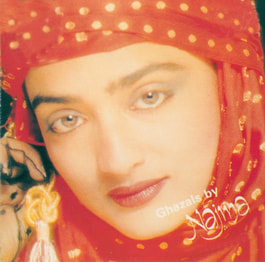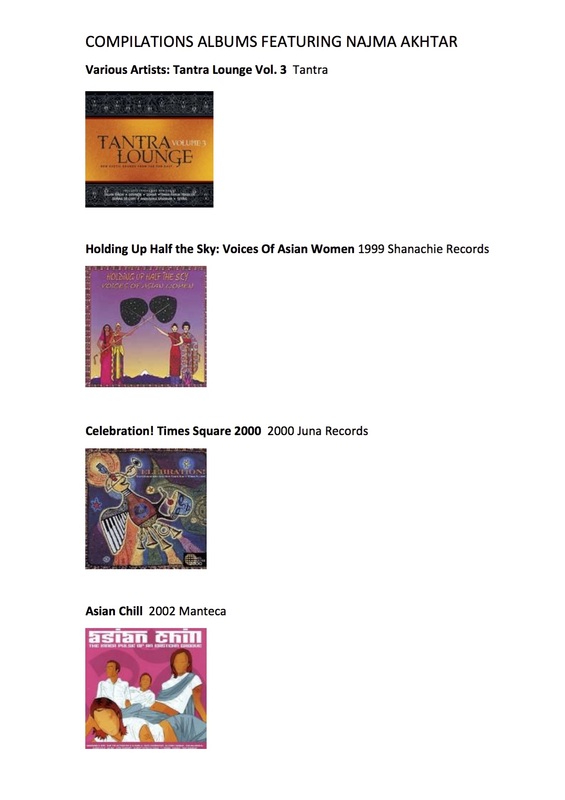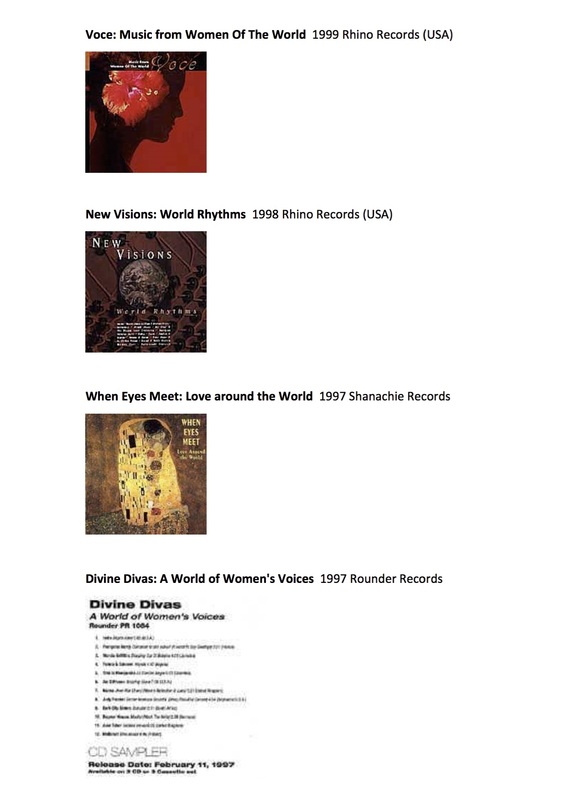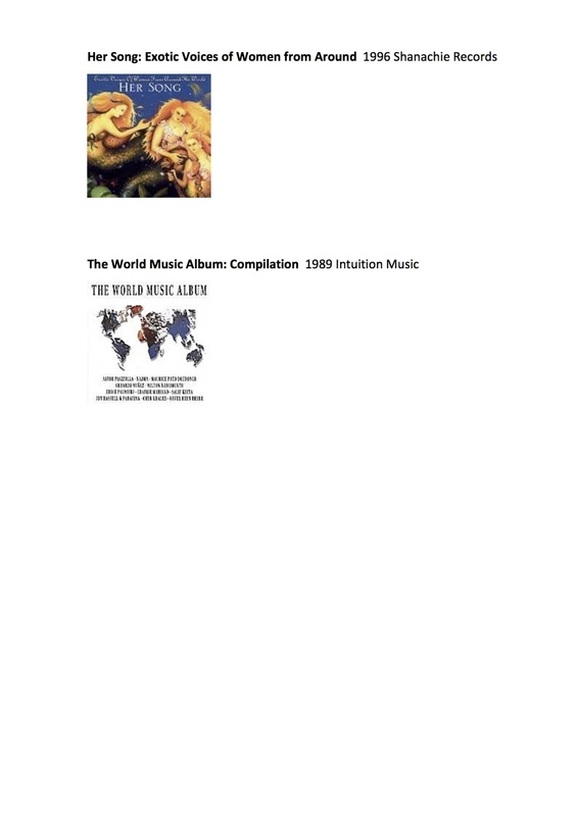Discography
|
Description
Najma Akhtar’s ‘Five Rivers’ album released through Last Minute Productions (LMP) April. A career that has seen her collaborate with many world-class artists, as diverse as Jah Wobble, Jimmy Page and Robert Plant, Andy Summers, Basement Jaxx, Jethro Tull, Philip Glass, Gary Lucas (of Captain Beefheart) and many more.
A musical journey, ‘Five Rivers’ begins in India at the River Ganges and continues on to Africa and the River Niger, to Great Britain and Ireland, with the River Thames and the River Shannon and across the Atlantic to the majesty of the great Mississippi River. Throughout this album, Najma explores the synergies that exist between the ancient poetic art form of the Indian Ghazal and the Western traditions of song.
‘Five Rivers’ is the first project in which Najma’s focus has been on the Western canon of song. She says, “Using selected covers, my interpretation of songs written by Donovan, Tim Hardin, Bryan MacLean, Rev Gary Davis and the mystical love poetry of W. B. Yeats has allowed me to compare the many shared reference points between the ancient tradition of Ghazal (romantic Urdu poetry) and the Western tradition of lyric poetry, both beautifully address the issues of unrequited loss, tragedy & disillusionment”.
‘Five Rivers’ can be best described as a confluence of the musical, poetic and linguistic traditions of the East and the West, brought together through the purity and beauty of voice. In researching this project, Najma has absorbed the distinct musical traditions of West Africa, the Mississippi Delta, the Western Folk tradition, Ghazal, Rock music, Jazz and Psychedelia, taking only that which would serve to demonstrate their interconnectivity.
The breadth & depth of Najma's vision of universality is exemplified by her beautiful rendition of W.B. Yeat's, "The Song of Wandering Aengus,' (inspired by Donovan's arrangement) & Donovan's ‘Young Girl Blues’.
'Five Rivers' has received brilliant reviews and further includes imaginative interpretations of compositions by Tim Hardin and Bryan MacLean ('Love'). Donovan also expressed his delight at having his songs included in the 'Five Rivers' project.
Najma is very excited about the album: “It is the first time that the poetic emphasis between the Urdu Ghazal and Western poetry has been explored and developed using western musical genres. The synergies that connect them are multifarious. It is the voice that tells the story, and these ballads of unrequited love are universal”.
The musical arrangements of ‘Five Rivers’ reflect Najma’s premise of interconnectivity, employing the Indian Harmonium, Violin, Tabla, Electric Guitar & Bass, the African Udo & N'goni, all of which serve to support, enhance and truly showcase the profound soulfulness of Najma Akhtar’s voice.
ALBUM REVIEW QUOTES
“This is no crossover; it is a bold metaphorical journey in which she sails down the five rivers of the title – the Ganges, Niger, Thames, Shannon and Mississippi.”
- Nigel Williamson - Songlines / March 2020
Highlights are frequent, and include a breathtaking, Black Is The Colour Of My True Loves Hair featuring a flowing, nuanced vocal performance reminiscent of Jeff Buckley, and Akhtar’s own entrancing composition Dancing Waltz.
- Rich Davenport, Record collector / May issue 2020
“To sum up, this is coherent, Intelligent, listenable and very successful.”
- Norman Darwen - Rock n Reel Magazine / Issue 80 March / April 2020
“Mysticism to spare on a sonic expedition from the Ganges to the Thames… deftly combines ancient Indian poetic artistry with Western folk and rock forms”
- Paul Sexton, Prog Magazine / April 2020
Her unfailing integrity has attracted critical acclaim from Rolling Stone magazine which praised her “effortless artistry and emotional daring” and The Observer which declared “The pure soaring arc of Najma’s voice remains above emulation”.
In a note to Najma, responding to her recording of the Bryan MacLean song, ‘Old Man’ from Love’s classic ‘Forever Changes’ album, former Elektra label boss, Jac Holzman had this to say: “Your take is original, understated and true to the spirit of the original. Most important – it works!”
Najma Akhtar’s ‘Five Rivers’ album released through Last Minute Productions (LMP) April. A career that has seen her collaborate with many world-class artists, as diverse as Jah Wobble, Jimmy Page and Robert Plant, Andy Summers, Basement Jaxx, Jethro Tull, Philip Glass, Gary Lucas (of Captain Beefheart) and many more.
A musical journey, ‘Five Rivers’ begins in India at the River Ganges and continues on to Africa and the River Niger, to Great Britain and Ireland, with the River Thames and the River Shannon and across the Atlantic to the majesty of the great Mississippi River. Throughout this album, Najma explores the synergies that exist between the ancient poetic art form of the Indian Ghazal and the Western traditions of song.
‘Five Rivers’ is the first project in which Najma’s focus has been on the Western canon of song. She says, “Using selected covers, my interpretation of songs written by Donovan, Tim Hardin, Bryan MacLean, Rev Gary Davis and the mystical love poetry of W. B. Yeats has allowed me to compare the many shared reference points between the ancient tradition of Ghazal (romantic Urdu poetry) and the Western tradition of lyric poetry, both beautifully address the issues of unrequited loss, tragedy & disillusionment”.
‘Five Rivers’ can be best described as a confluence of the musical, poetic and linguistic traditions of the East and the West, brought together through the purity and beauty of voice. In researching this project, Najma has absorbed the distinct musical traditions of West Africa, the Mississippi Delta, the Western Folk tradition, Ghazal, Rock music, Jazz and Psychedelia, taking only that which would serve to demonstrate their interconnectivity.
The breadth & depth of Najma's vision of universality is exemplified by her beautiful rendition of W.B. Yeat's, "The Song of Wandering Aengus,' (inspired by Donovan's arrangement) & Donovan's ‘Young Girl Blues’.
'Five Rivers' has received brilliant reviews and further includes imaginative interpretations of compositions by Tim Hardin and Bryan MacLean ('Love'). Donovan also expressed his delight at having his songs included in the 'Five Rivers' project.
Najma is very excited about the album: “It is the first time that the poetic emphasis between the Urdu Ghazal and Western poetry has been explored and developed using western musical genres. The synergies that connect them are multifarious. It is the voice that tells the story, and these ballads of unrequited love are universal”.
The musical arrangements of ‘Five Rivers’ reflect Najma’s premise of interconnectivity, employing the Indian Harmonium, Violin, Tabla, Electric Guitar & Bass, the African Udo & N'goni, all of which serve to support, enhance and truly showcase the profound soulfulness of Najma Akhtar’s voice.
ALBUM REVIEW QUOTES
“This is no crossover; it is a bold metaphorical journey in which she sails down the five rivers of the title – the Ganges, Niger, Thames, Shannon and Mississippi.”
- Nigel Williamson - Songlines / March 2020
Highlights are frequent, and include a breathtaking, Black Is The Colour Of My True Loves Hair featuring a flowing, nuanced vocal performance reminiscent of Jeff Buckley, and Akhtar’s own entrancing composition Dancing Waltz.
- Rich Davenport, Record collector / May issue 2020
“To sum up, this is coherent, Intelligent, listenable and very successful.”
- Norman Darwen - Rock n Reel Magazine / Issue 80 March / April 2020
“Mysticism to spare on a sonic expedition from the Ganges to the Thames… deftly combines ancient Indian poetic artistry with Western folk and rock forms”
- Paul Sexton, Prog Magazine / April 2020
Her unfailing integrity has attracted critical acclaim from Rolling Stone magazine which praised her “effortless artistry and emotional daring” and The Observer which declared “The pure soaring arc of Najma’s voice remains above emulation”.
In a note to Najma, responding to her recording of the Bryan MacLean song, ‘Old Man’ from Love’s classic ‘Forever Changes’ album, former Elektra label boss, Jac Holzman had this to say: “Your take is original, understated and true to the spirit of the original. Most important – it works!”
|
VINYL - ( Record Store Day – Saturday 20th June 2020)
FIVE RIVERS Vinyl Track info ⓟ & © Last Minute Productions 2020 Catalogue Number, JAAN 1104 Total Running Time Side A – 20:40 Total Running Time Side B – 21:11 Side A Track Order 1. Black Is The Colour Of My True Loves Hair (World/Rock) 6:22 2. Cryin’ Crazy 6:08 3. Old Man 3:39 4. The Song Of Wandering Aengus 4:15 Side B track Order 1. Death Don’t Have No mercy 5:05 2. Season Of The Witch 4:43 3. Dancing Waltz 5:58 4. You Upset The Grace Of Living When You Lie 5:25 |
|
Description
By simply using guitars, tabla, vocal and the occasional violin, ‘RISHTE’, once again, stands out as another milestone in terms of crossover music. Gary’s wizard playing incorporates psychedelic sounds, the blues, soft rock and other eclectic sounds and Najma provides the Indian influences with Urdu/ Hindi lyrics and soothing sublime seductive Indian vocal melodies.
The overtone of ‘Rishte’, is yet another superb collaboration of east and western ideas that open the doors to a new genre of Ghazal and the Blues. By using the southern US blues styling with the odd slide guitar or electric by shuffling rhythmic strums, bending, winding acoustic notes on guitar has an analogy and synergy with the naturally flowing Indian vocals. The cover of Skip James’s ‘Special Rider Blues’ proves that the concept, of Ghazal and Blues are connected, as the vocal styles and musicality share the same passion. By writing some songs based on the Ghazal and using some blues arrangements takes the Ghazal on another musical path that is equally mesmerizing. There is a perfect synergy.
The lyrics are predominantly in Urdu, as Najma felt very strong that the exotic vocal ‘Aalaap’ or exotic waling often taken as the eastern element was not what she wanted to do. More importantly, Najma wanted lyrics on this album that would attract an audience that understood, Hindi, Urdu, Punjabi and other similar dialects. As with Blues and C/W the songs tell a story and this was something that intrigued Najma, so the lyrics on Rishte also tells stories, which was a new approach to the lyrics of a Ghazal as they generally relate to a romantic notion and emotion.
The eclectic experiences, richness and musical sensibility of both artists have brought to life a unique and soulful album; another new genre seems to have appeared: Ghazal and Blues.
The reviews and feedback for this album are phenomenal, a few are listed below:
To hear Akhtar climb the musical spheres on “Woh Dhin” as Lucas’ guitar launches into the land of a thousand bumble bees, or to marvel at their transfixing transformation of Skip James’ “Special Rider Blues” into outré expression is to understand what creativity is truly capable of. This collaboration is all about magic, because there has not been anything like it made before. It is bending consciousness to take us somewhere new, and deep into its different emotional states we come to realize suddenly we are standing somewhere we have not been. There are moments of pure blues bumped up next to flights of melodic bliss, and by the end of the album comes the realization that, really, no names need to be given. Like life at its best, it just is.
Sonic Boomers Review July 09
As for Akhtar, her voice is a heaven-sent gift. If she had made this album with that other noted blues aficionado, Robert Plant, it would surely sell a million and win a Grammy.
Nigel Williamson Songlines Top of the World Review June 2009
Pitting her gilded tones against vigorous, bluesy strumming from American guitarist Lucas, this album’s best tracks pack an intensity that could give her belated, but much deserved, recognition.
Mark Hudson, The Daily Telegraph June 09
Rishte is dynamic and challenging, a 21st century Indo-Amercian blues fusion that suggests the West and East can communicate with much greater ease than many of our politicians would allow us to believe.
Garth Cartwright, Folk Roots June 09
‘The record you did together is an absolute masterpiece and should catapult the so-called world-music (musics of the world - les musiques du monde would be a better term) to a new level’.
Karl Lippegaus, German national Radio Deutschlandfunk, June 6th 09
Whether the songs concern themselves with humble submission to destiny ('Rishte') or the pangs of unrequited love ('Behaal'), celebrate burgeoning romance ('Naya Dhin') or reflect on the ephemerality of life ('Pensif Khayal'), the mutual compatibility and commitment of Akhtar and Lucas are apparent throughout, and the resulting album (which also contains an intriguing visit to Skip James's 'Special Rider Blues' and a powerfully atmospheric song, 'Soul Taker', inspired by English witch legend) is, quite simply, ravishingly beautiful and comes unreservedly recommended.
The Vortex Website July 09
There have been many attempts to combine the blues with the music of the Indian subcontinent, but seldom have they been as interesting or successful as the new collaboration between guitar wizard Gary Lucas and ghazal-diva Najma AkhtarABC National Radio, The Daily Planet (Australian radio program) - Andy Copeman June 2009
One of the most interesting fusion of sounds is to be found on ‘Strings on Naya Dhin’ where folk-blues guitar and tabla combine over a vaster musical landscape that seems to be influenced in part at least by Bollywood film soundtracks. In contrast ‘Fragrance’ has a distinctly country-folk feel reinforced by the use of slide guitar. English vocals are provided by Akhtar on the blues-inflected ‘Special Rider Blues’ while echoey vocals predominate over a tabla and sitar backdrop on ‘Aksar’. In some respects this recalls the Taj Mahal project of a few years back bringing together blues and African traditional sounds, yet is a good deal more ambitious in successfully combining Indian and blues sounds. A potential candidate for rootsiest album of the year.
Tim Stenhouse UK Vibe website July 09
As she navigates the fast syllables on Behaal, Lucas leaps in with a psychedelic solo, while Parda is a stunning baroque-folk raga. Indeed, far from being some polite fusion project, Rishte is vital and red-blooded, nodding back to Davy Graham’s East-West musical explorations, and standing comparison with his best work.
Mojo (4 STARS)July 09 – Mike Barnes
The songs are mostly self-written, Lucas providing the guitar parts and Najma the melodies and lyrics (usually in Urdu, but also once or twice in English, a language that does not quite accommodate the full fluent diction of the singer) on songs that possess an almost timeless ethereal quality and ability to sweetly seduce over and over again. A wholly satisfying mix.
Asia / Pacific ReviewsGlobal Music Culture - Con Murphy Saturday 13 June 2009
Najma added a psychedelic sound to her list of eclectic influences on her 2009 Rishte album with Grammy nominated guitarist Gary Lucas. The reviews were brilliant worldwide. In particular, Skip James', 'Special Rider Blues' was singled out by critics for Najma’s stunning arrangement & vocal performance. The overwhelmingly positive reviews of 'Special Rider Blues' provided the initial inspiration for "FIVE RIVERS".
By simply using guitars, tabla, vocal and the occasional violin, ‘RISHTE’, once again, stands out as another milestone in terms of crossover music. Gary’s wizard playing incorporates psychedelic sounds, the blues, soft rock and other eclectic sounds and Najma provides the Indian influences with Urdu/ Hindi lyrics and soothing sublime seductive Indian vocal melodies.
The overtone of ‘Rishte’, is yet another superb collaboration of east and western ideas that open the doors to a new genre of Ghazal and the Blues. By using the southern US blues styling with the odd slide guitar or electric by shuffling rhythmic strums, bending, winding acoustic notes on guitar has an analogy and synergy with the naturally flowing Indian vocals. The cover of Skip James’s ‘Special Rider Blues’ proves that the concept, of Ghazal and Blues are connected, as the vocal styles and musicality share the same passion. By writing some songs based on the Ghazal and using some blues arrangements takes the Ghazal on another musical path that is equally mesmerizing. There is a perfect synergy.
The lyrics are predominantly in Urdu, as Najma felt very strong that the exotic vocal ‘Aalaap’ or exotic waling often taken as the eastern element was not what she wanted to do. More importantly, Najma wanted lyrics on this album that would attract an audience that understood, Hindi, Urdu, Punjabi and other similar dialects. As with Blues and C/W the songs tell a story and this was something that intrigued Najma, so the lyrics on Rishte also tells stories, which was a new approach to the lyrics of a Ghazal as they generally relate to a romantic notion and emotion.
The eclectic experiences, richness and musical sensibility of both artists have brought to life a unique and soulful album; another new genre seems to have appeared: Ghazal and Blues.
The reviews and feedback for this album are phenomenal, a few are listed below:
To hear Akhtar climb the musical spheres on “Woh Dhin” as Lucas’ guitar launches into the land of a thousand bumble bees, or to marvel at their transfixing transformation of Skip James’ “Special Rider Blues” into outré expression is to understand what creativity is truly capable of. This collaboration is all about magic, because there has not been anything like it made before. It is bending consciousness to take us somewhere new, and deep into its different emotional states we come to realize suddenly we are standing somewhere we have not been. There are moments of pure blues bumped up next to flights of melodic bliss, and by the end of the album comes the realization that, really, no names need to be given. Like life at its best, it just is.
Sonic Boomers Review July 09
As for Akhtar, her voice is a heaven-sent gift. If she had made this album with that other noted blues aficionado, Robert Plant, it would surely sell a million and win a Grammy.
Nigel Williamson Songlines Top of the World Review June 2009
Pitting her gilded tones against vigorous, bluesy strumming from American guitarist Lucas, this album’s best tracks pack an intensity that could give her belated, but much deserved, recognition.
Mark Hudson, The Daily Telegraph June 09
Rishte is dynamic and challenging, a 21st century Indo-Amercian blues fusion that suggests the West and East can communicate with much greater ease than many of our politicians would allow us to believe.
Garth Cartwright, Folk Roots June 09
‘The record you did together is an absolute masterpiece and should catapult the so-called world-music (musics of the world - les musiques du monde would be a better term) to a new level’.
Karl Lippegaus, German national Radio Deutschlandfunk, June 6th 09
Whether the songs concern themselves with humble submission to destiny ('Rishte') or the pangs of unrequited love ('Behaal'), celebrate burgeoning romance ('Naya Dhin') or reflect on the ephemerality of life ('Pensif Khayal'), the mutual compatibility and commitment of Akhtar and Lucas are apparent throughout, and the resulting album (which also contains an intriguing visit to Skip James's 'Special Rider Blues' and a powerfully atmospheric song, 'Soul Taker', inspired by English witch legend) is, quite simply, ravishingly beautiful and comes unreservedly recommended.
The Vortex Website July 09
There have been many attempts to combine the blues with the music of the Indian subcontinent, but seldom have they been as interesting or successful as the new collaboration between guitar wizard Gary Lucas and ghazal-diva Najma AkhtarABC National Radio, The Daily Planet (Australian radio program) - Andy Copeman June 2009
One of the most interesting fusion of sounds is to be found on ‘Strings on Naya Dhin’ where folk-blues guitar and tabla combine over a vaster musical landscape that seems to be influenced in part at least by Bollywood film soundtracks. In contrast ‘Fragrance’ has a distinctly country-folk feel reinforced by the use of slide guitar. English vocals are provided by Akhtar on the blues-inflected ‘Special Rider Blues’ while echoey vocals predominate over a tabla and sitar backdrop on ‘Aksar’. In some respects this recalls the Taj Mahal project of a few years back bringing together blues and African traditional sounds, yet is a good deal more ambitious in successfully combining Indian and blues sounds. A potential candidate for rootsiest album of the year.
Tim Stenhouse UK Vibe website July 09
As she navigates the fast syllables on Behaal, Lucas leaps in with a psychedelic solo, while Parda is a stunning baroque-folk raga. Indeed, far from being some polite fusion project, Rishte is vital and red-blooded, nodding back to Davy Graham’s East-West musical explorations, and standing comparison with his best work.
Mojo (4 STARS)July 09 – Mike Barnes
The songs are mostly self-written, Lucas providing the guitar parts and Najma the melodies and lyrics (usually in Urdu, but also once or twice in English, a language that does not quite accommodate the full fluent diction of the singer) on songs that possess an almost timeless ethereal quality and ability to sweetly seduce over and over again. A wholly satisfying mix.
Asia / Pacific ReviewsGlobal Music Culture - Con Murphy Saturday 13 June 2009
Najma added a psychedelic sound to her list of eclectic influences on her 2009 Rishte album with Grammy nominated guitarist Gary Lucas. The reviews were brilliant worldwide. In particular, Skip James', 'Special Rider Blues' was singled out by critics for Najma’s stunning arrangement & vocal performance. The overwhelmingly positive reviews of 'Special Rider Blues' provided the initial inspiration for "FIVE RIVERS".
Description
Produced by Serge Glanzberg and recorded in Paris with musicians from very diverse cultures and backgrounds adding even more multiculturalism to the flavour of Najma’s past works. Paris was selected to record the project because Najma felt that, at that time, Paris was the cultural hybrid melting pot of World Music. She says, “Its charisma and aura”, the availability of musicians and a general good vibe made it the right choice. In this album Najma's soulful, semi-classical Indian voice is the centrepiece, enveloped by music that continues to cross over to the jazz world but this time incorporating semi-acoustic Mediterranean influences and instruments.
The songs remain earthy, grounded and consistent with her past recordings. For Najma, it was extremely important to keep the same integrity of her previous recordings. Najma surrounds herself with some remarkable musicians, including Steve Coleman (saxophone), Olivier Louvel (guitarist and Saaz player) and Felix Sabaleco (drums). Najma, easily, switches back and forth between the slightly western vocal ideas for example, the short Staccato breathier phrases to the long dreamy notes of Raags, she has managed to go full circle.
The result is a recording that Najma says, "Is a bit more daring, in terms of opening the doors to a more modern, semi- acoustic, experimental and adventurous journey into Indian World Music.
‘’This time we had the opportunity as well as the maturity in our collaboration to be able to go all the way in our common and respective eclecticisms, to rediscover ourselves in a reincarnation on several different levels. With ‘Fariyaad’, Najma wanted to be surprised by a music that emanated from the confrontation of her origins with her desires. Daring confluence, newness, doubt, liberty, she wanted to take the road already walked with and for others, but this time to inverse the relationship of exoticism. To consider jazz, rock, drum ‘n’ bass, etc., as exotic elements from the point of view of her tradition and to be the one who invites.
Thus, it was necessary to weave around Najma’s compositions, a new language where several musical universes could find their place and reveal the richness of her influences without them being diluted.
In this album the predominance of Mediterranean instruments distils an impression of India, liberating interpretation from the constraints of tradition. It was, as if, with each respiration, a new breath caused Indian music to vibrate anew. By integrating Ghazal and elements of Indian semi-classical vocals with harmony lines that are more or less contemporary, we have also sought to reincarnate the psychedelic spirit and aesthetic as near as possible to the personality and aspirations of Najma. ‘Fariyaad’, therefore stands as another unique and ground-breaking album from Najma Akhtar’’.
Serge Glanzberg.
Produced by Serge Glanzberg and recorded in Paris with musicians from very diverse cultures and backgrounds adding even more multiculturalism to the flavour of Najma’s past works. Paris was selected to record the project because Najma felt that, at that time, Paris was the cultural hybrid melting pot of World Music. She says, “Its charisma and aura”, the availability of musicians and a general good vibe made it the right choice. In this album Najma's soulful, semi-classical Indian voice is the centrepiece, enveloped by music that continues to cross over to the jazz world but this time incorporating semi-acoustic Mediterranean influences and instruments.
The songs remain earthy, grounded and consistent with her past recordings. For Najma, it was extremely important to keep the same integrity of her previous recordings. Najma surrounds herself with some remarkable musicians, including Steve Coleman (saxophone), Olivier Louvel (guitarist and Saaz player) and Felix Sabaleco (drums). Najma, easily, switches back and forth between the slightly western vocal ideas for example, the short Staccato breathier phrases to the long dreamy notes of Raags, she has managed to go full circle.
The result is a recording that Najma says, "Is a bit more daring, in terms of opening the doors to a more modern, semi- acoustic, experimental and adventurous journey into Indian World Music.
‘’This time we had the opportunity as well as the maturity in our collaboration to be able to go all the way in our common and respective eclecticisms, to rediscover ourselves in a reincarnation on several different levels. With ‘Fariyaad’, Najma wanted to be surprised by a music that emanated from the confrontation of her origins with her desires. Daring confluence, newness, doubt, liberty, she wanted to take the road already walked with and for others, but this time to inverse the relationship of exoticism. To consider jazz, rock, drum ‘n’ bass, etc., as exotic elements from the point of view of her tradition and to be the one who invites.
Thus, it was necessary to weave around Najma’s compositions, a new language where several musical universes could find their place and reveal the richness of her influences without them being diluted.
In this album the predominance of Mediterranean instruments distils an impression of India, liberating interpretation from the constraints of tradition. It was, as if, with each respiration, a new breath caused Indian music to vibrate anew. By integrating Ghazal and elements of Indian semi-classical vocals with harmony lines that are more or less contemporary, we have also sought to reincarnate the psychedelic spirit and aesthetic as near as possible to the personality and aspirations of Najma. ‘Fariyaad’, therefore stands as another unique and ground-breaking album from Najma Akhtar’’.
Serge Glanzberg.
Description
‘Vivid’, also released on 2nd Sight Records, is a collaborative production with Najma and film composer Richard Grassby-Lewis. It differs from her previous styles of using jazz arrangements by blending more tabla mixes and trance beats, electronic music styles such as drum and bass and sampling. It incorporates Arabic and Indian music with Western classical arrangements leaning towards a more atmospheric studio based sampled album. ‘Vivid’ investigates the dark moodiness and mysteriousness of the Indian underground theme and comes out in a genre of its own. ‘Indian Gothic’
It’s a name that fits perfectly; like gothic art and architecture, the album is complex, graceful and magical. Sung sometimes in English, sometimes in Urdu, its songs evoke moods full of longing, regret, escape and confrontation, yet somehow retains a spirit of hope. Crystalline incantations that touch upon the divine to reveal harmony and seduction through the power of voice and lyrics and so Najma continues to sing of the nostalgia of lost, unrequited or forbidden love in the style of Ghazal, Thumri and Geet, but in a completely new and unique style.
"Vocally, Najma incorporates haunting vocals that quiver with crystalline complexity. Overall, the musical complexities and vocal acrobatics of Najma should convince even the most discriminating listener to pick up a copy of Vivid."
Mathew J Forss, Inside World Music
“Since Najma Akhtar released her ground-breaking fusion album Qareeb in the late 1980s, the sounds of the Indian sub-continent have become a steadily more familiar fixture in western pop. Mixes of tablas and trance beats, Bollywood strings and synths, is now part of the musical landscape. The pure, soaring arc of Najma's voice remains beyond emulation, however, Vivid provides her vocal talents with their most adventurous settings yet, twisting together the traditions of east and west in new and unexpected ways, marrying Arabic rhythms, modal tunings, and western classical leanings. The record results from collaboration between Najma, who wrote its lyrics and melodies, and Richard Grassby-Lewis, whose background in film music is evident in Vivid's cinematic atmospheres. Both are artists whose grasp of music is global. Searching for a tag to describe their distinctive sound, Najma and Richard alighted on "Indian Gothic". It's a name, which fits perfectly; like gothic art and architecture, the album is complex, graceful and magical. Sung sometimes in English, sometimes in Urdu, its' songs evoke moods full of longing, regret, escape and confrontation; yet somehow retain a spirit of hope. Vivid is twenty-first century gothic."
Neil Spencer (The Observer)
‘Vivid’, also released on 2nd Sight Records, is a collaborative production with Najma and film composer Richard Grassby-Lewis. It differs from her previous styles of using jazz arrangements by blending more tabla mixes and trance beats, electronic music styles such as drum and bass and sampling. It incorporates Arabic and Indian music with Western classical arrangements leaning towards a more atmospheric studio based sampled album. ‘Vivid’ investigates the dark moodiness and mysteriousness of the Indian underground theme and comes out in a genre of its own. ‘Indian Gothic’
It’s a name that fits perfectly; like gothic art and architecture, the album is complex, graceful and magical. Sung sometimes in English, sometimes in Urdu, its songs evoke moods full of longing, regret, escape and confrontation, yet somehow retains a spirit of hope. Crystalline incantations that touch upon the divine to reveal harmony and seduction through the power of voice and lyrics and so Najma continues to sing of the nostalgia of lost, unrequited or forbidden love in the style of Ghazal, Thumri and Geet, but in a completely new and unique style.
"Vocally, Najma incorporates haunting vocals that quiver with crystalline complexity. Overall, the musical complexities and vocal acrobatics of Najma should convince even the most discriminating listener to pick up a copy of Vivid."
Mathew J Forss, Inside World Music
“Since Najma Akhtar released her ground-breaking fusion album Qareeb in the late 1980s, the sounds of the Indian sub-continent have become a steadily more familiar fixture in western pop. Mixes of tablas and trance beats, Bollywood strings and synths, is now part of the musical landscape. The pure, soaring arc of Najma's voice remains beyond emulation, however, Vivid provides her vocal talents with their most adventurous settings yet, twisting together the traditions of east and west in new and unexpected ways, marrying Arabic rhythms, modal tunings, and western classical leanings. The record results from collaboration between Najma, who wrote its lyrics and melodies, and Richard Grassby-Lewis, whose background in film music is evident in Vivid's cinematic atmospheres. Both are artists whose grasp of music is global. Searching for a tag to describe their distinctive sound, Najma and Richard alighted on "Indian Gothic". It's a name, which fits perfectly; like gothic art and architecture, the album is complex, graceful and magical. Sung sometimes in English, sometimes in Urdu, its' songs evoke moods full of longing, regret, escape and confrontation; yet somehow retain a spirit of hope. Vivid is twenty-first century gothic."
Neil Spencer (The Observer)
Description
Produced by Najma and music arranged by Bass player/Arranger, John Deemer, Pukar is seen as a natural progression from the previous albums. This album explores styles of improvisation raga, Geet and other musical themes associated with Indian culture with light jazz influences and other western instrumentation & arrangements. For example, the Indian wedding theme, where one has the joy and happiness of traditional Heena (Mehndi) ceremonies, ‘Jhoomo Gao’, and then the sorrow of the Bidai (where the bride departs her home for the new one of her husband), ‘Baabul’, so the moods and lyrics are quite different. Another change from tradition was to use the normal intro Alaap at the end of the Ghazal instead of the beginning as on the track ‘Jheel mai Chand’. This album also explores new instrumentation coming from Persia, Oud (Persian stringed instrument), Indian Shehnai (Indian Horn instrument) and African marimba sounds, together with Indian vocals still based on the Ghazal, adds another new dimension.
"Pukar, Najma's follow-up to her world music breakthrough Atish, is every bit as enchanting and splendid as its predecessor, displaying her ability to make Indian music accessible for Western audiences without diluting its essence."
All Music Guide
“Recommended are Pukar and Qareeb if you like to be transported by the rapturous and seductive tones of a gal who really ought to know better. What untold damage could be visited upon the hearts and minds of us gullible and Western fools? I don't suppose she does it on purpose, but be warned: dollars depart from wallets as she Plants her soul on the Pages of your bank account.”
Ian Anderson
Her music has the passion of a raging fire. In Pukar, Najma’s is at her best. The melody in almost all the songs is essentially classical and her voice, now more mellifluous that ever before, brings to each song a romantic tone.
Jai Kumar, DJ Magazine
Produced by Najma and music arranged by Bass player/Arranger, John Deemer, Pukar is seen as a natural progression from the previous albums. This album explores styles of improvisation raga, Geet and other musical themes associated with Indian culture with light jazz influences and other western instrumentation & arrangements. For example, the Indian wedding theme, where one has the joy and happiness of traditional Heena (Mehndi) ceremonies, ‘Jhoomo Gao’, and then the sorrow of the Bidai (where the bride departs her home for the new one of her husband), ‘Baabul’, so the moods and lyrics are quite different. Another change from tradition was to use the normal intro Alaap at the end of the Ghazal instead of the beginning as on the track ‘Jheel mai Chand’. This album also explores new instrumentation coming from Persia, Oud (Persian stringed instrument), Indian Shehnai (Indian Horn instrument) and African marimba sounds, together with Indian vocals still based on the Ghazal, adds another new dimension.
"Pukar, Najma's follow-up to her world music breakthrough Atish, is every bit as enchanting and splendid as its predecessor, displaying her ability to make Indian music accessible for Western audiences without diluting its essence."
All Music Guide
“Recommended are Pukar and Qareeb if you like to be transported by the rapturous and seductive tones of a gal who really ought to know better. What untold damage could be visited upon the hearts and minds of us gullible and Western fools? I don't suppose she does it on purpose, but be warned: dollars depart from wallets as she Plants her soul on the Pages of your bank account.”
Ian Anderson
Her music has the passion of a raging fire. In Pukar, Najma’s is at her best. The melody in almost all the songs is essentially classical and her voice, now more mellifluous that ever before, brings to each song a romantic tone.
Jai Kumar, DJ Magazine
VINYL
PUKAR (Calling You) Vinyl Track info
ⓟ & © Last Minute Productions 2020 Catalogue Number, JAAN 1101
Total Running Time Side A – 24:01
Total Running Time Side B – 26:08
Side A
1. Jheel Mai Chand 5:21
2. Mousum Suhana 3:15
3. Dil Mai 4:58
4. Jhoomo Gao 5:43
5. Pukar 4:44
Side B
6. Baabul 5:23
7. Improvisation (Semi-Classical) 8:03
8. Dil Jala Ne 8:18
9. Pukar (Without Tabla) 4:21
LIMITED CASSETTES ALSO AVAILABLE
PUKAR (Calling You) Vinyl Track info
ⓟ & © Last Minute Productions 2020 Catalogue Number, JAAN 1101
Total Running Time Side A – 24:01
Total Running Time Side B – 26:08
Side A
1. Jheel Mai Chand 5:21
2. Mousum Suhana 3:15
3. Dil Mai 4:58
4. Jhoomo Gao 5:43
5. Pukar 4:44
Side B
6. Baabul 5:23
7. Improvisation (Semi-Classical) 8:03
8. Dil Jala Ne 8:18
9. Pukar (Without Tabla) 4:21
LIMITED CASSETTES ALSO AVAILABLE
Description
Also released on Fang records this co-produced album between Najma and American musician, Chris Rael, of the band Church of Betty, focuses on the concept of Indian Film Songs. Recorded in the USA, this album was by no means a remix but by staying true to the original and incorporating subtle small changes it has its own sound. Rael's band had previously experimented with Indian and western music.
After meeting Najma at the Contemporary Indian Music Festival in Vienna, Najma and Rael began work on this tribute album to the renowned, prolific and pioneering composer of popular Hindi film music, SD. Burman. His influence spanned between the 1950s and the 1970s and India’s most famous playback singers usually sang his songs. Many of his songs became household classics and his son, R.D. Burman, continued his father's legacy and became an equally successful composer.
Forbidden Kiss was co-arranged with New York composer Brian Woodbury while Najma provided the vocal accompaniments. The songs featured on the album are from popular Indian films such as, Guide, Jewel Thief, Aradhana, and Prem Nagar many of which were also suggested by Najma’s mother, Mrs. Shafiqua Akhtar due her knowledge, experience and connection with the Indian film industry through the past family printing business.
"Forbidden Kiss is entertaining, a brilliant tuneful set."
Boston Herald
"Forbidden Kiss is a musical and cultural fusion of the first order."
Boston Tribune. - K.R.C.
“Although unlike anything else in either of their catalogs, Forbidden Kiss was arguably the strongest music both Akhtar and Rael had made up to this point in their musical lives”.
Stanton Swihart, All Music Guide (5 star)
Also released on Fang records this co-produced album between Najma and American musician, Chris Rael, of the band Church of Betty, focuses on the concept of Indian Film Songs. Recorded in the USA, this album was by no means a remix but by staying true to the original and incorporating subtle small changes it has its own sound. Rael's band had previously experimented with Indian and western music.
After meeting Najma at the Contemporary Indian Music Festival in Vienna, Najma and Rael began work on this tribute album to the renowned, prolific and pioneering composer of popular Hindi film music, SD. Burman. His influence spanned between the 1950s and the 1970s and India’s most famous playback singers usually sang his songs. Many of his songs became household classics and his son, R.D. Burman, continued his father's legacy and became an equally successful composer.
Forbidden Kiss was co-arranged with New York composer Brian Woodbury while Najma provided the vocal accompaniments. The songs featured on the album are from popular Indian films such as, Guide, Jewel Thief, Aradhana, and Prem Nagar many of which were also suggested by Najma’s mother, Mrs. Shafiqua Akhtar due her knowledge, experience and connection with the Indian film industry through the past family printing business.
"Forbidden Kiss is entertaining, a brilliant tuneful set."
Boston Herald
"Forbidden Kiss is a musical and cultural fusion of the first order."
Boston Tribune. - K.R.C.
“Although unlike anything else in either of their catalogs, Forbidden Kiss was arguably the strongest music both Akhtar and Rael had made up to this point in their musical lives”.
Stanton Swihart, All Music Guide (5 star)
Description
An artistic collaborative product between Najma & producers, Iain Scott & Bunt Stafford Clark of Triple Earth Records, ‘Atish’ features an enjoyable mix of musical styles from the Indian sub-continent, subtle elements of jazz and other western influences that combine Najma's versatile voice to create a magical musical journey.
Based on raga Gaujri Toodi, the opening track ‘Atish Fishan’, has a lively hypnotic rhythmic intro that immediately sweeps you into another world and ‘Naina’, takes the Thoomri style of lyrics, melody and rhythm. By using a 14-beat gentle rhythmic cycle with fluid vocals and jazz, the song becomes very atmospheric. The jazz elements work particularly well in the soulful, slightly bluesy Ghazal ‘Apne Hathon’ with soaring saxophone complementing the Indian style vocals.
Again, in addition to Ghazal, Najma’s own compositions were pushed further forward with other genres, such as Qawali, Punjabi and Sufi Qalam (Spiritual song) and she was also challenged by covering a Country & Western classic song titled "Faithless Love’’ written by J. D. Souther.
With this diverse selection of songs, there is something to suit every mood, bringing the album’s compliment of languages to four. The music is a little more adventurous in terms of arrangement and style but keeping true to the use of subtle jazz arrangements. With Atish, Najma has once again received critical acclaim and has attracted wide audiences reaching No 4 in the Billboard World Music Chart.
"Atish transcends linguistic barriers (and) exists as a clear pointer to the future." Music Week
"This is immaculate music." The Guardian
Her arrangements of the ancient songs are more intricate and creative, she sings with greater control and occasional blues intonation’
International Herald Tribune – Mike Zwerin
Atish offers atoner superb demonstration of Najma’s ability to fuse the modern and traditional without selling either short. A unique melange of Asian forms with jazz, rock, even country, that should delight admirers and win a wider new audience.
Tradewinds UK
Najma’s beautiful voice sometimes double tracked, floats and swoops over arrangements and rhythms that are definitely India-meets- London 1989 in a melting pot style.
The Beat U.S.
An artistic collaborative product between Najma & producers, Iain Scott & Bunt Stafford Clark of Triple Earth Records, ‘Atish’ features an enjoyable mix of musical styles from the Indian sub-continent, subtle elements of jazz and other western influences that combine Najma's versatile voice to create a magical musical journey.
Based on raga Gaujri Toodi, the opening track ‘Atish Fishan’, has a lively hypnotic rhythmic intro that immediately sweeps you into another world and ‘Naina’, takes the Thoomri style of lyrics, melody and rhythm. By using a 14-beat gentle rhythmic cycle with fluid vocals and jazz, the song becomes very atmospheric. The jazz elements work particularly well in the soulful, slightly bluesy Ghazal ‘Apne Hathon’ with soaring saxophone complementing the Indian style vocals.
Again, in addition to Ghazal, Najma’s own compositions were pushed further forward with other genres, such as Qawali, Punjabi and Sufi Qalam (Spiritual song) and she was also challenged by covering a Country & Western classic song titled "Faithless Love’’ written by J. D. Souther.
With this diverse selection of songs, there is something to suit every mood, bringing the album’s compliment of languages to four. The music is a little more adventurous in terms of arrangement and style but keeping true to the use of subtle jazz arrangements. With Atish, Najma has once again received critical acclaim and has attracted wide audiences reaching No 4 in the Billboard World Music Chart.
"Atish transcends linguistic barriers (and) exists as a clear pointer to the future." Music Week
"This is immaculate music." The Guardian
Her arrangements of the ancient songs are more intricate and creative, she sings with greater control and occasional blues intonation’
International Herald Tribune – Mike Zwerin
Atish offers atoner superb demonstration of Najma’s ability to fuse the modern and traditional without selling either short. A unique melange of Asian forms with jazz, rock, even country, that should delight admirers and win a wider new audience.
Tradewinds UK
Najma’s beautiful voice sometimes double tracked, floats and swoops over arrangements and rhythms that are definitely India-meets- London 1989 in a melting pot style.
The Beat U.S.
VINYL LIMITED COPIES AVAILABLE
Gatefold album cover
ATISH (Fire) Vinyl Track info
ⓟ & © Last Minute Productions 2020
Catalogue Number, TerraVinyl 108 Triple Earth
Total Running Time Side A – 18:10
Total Running Time Side B – 18:20
Side A
1. Atish Fishan 6.16
2. Naina 5.45
3. Apne Hathon 5.44
Side B
4. Parvanon 2.33
5. Ni kala 4.31
6. Ghoom Charkhna 8.03
7. Faithless Love 3.13
LIMITED CASSETTES ALSO AVAILABLE
Gatefold album cover
ATISH (Fire) Vinyl Track info
ⓟ & © Last Minute Productions 2020
Catalogue Number, TerraVinyl 108 Triple Earth
Total Running Time Side A – 18:10
Total Running Time Side B – 18:20
Side A
1. Atish Fishan 6.16
2. Naina 5.45
3. Apne Hathon 5.44
Side B
4. Parvanon 2.33
5. Ni kala 4.31
6. Ghoom Charkhna 8.03
7. Faithless Love 3.13
LIMITED CASSETTES ALSO AVAILABLE
Description
The Ghazal occupies a unique place in music and poetry of the Indian sub-continent. A perfect example of a form, many hundreds of years old that has maintained its popularity throughout the ages, yet never more so than within the last 20 years, as singers have taken it from the light classical area into the more popular and accessible market with remarkable success. Najma is the first UK born singer to concentrate on this art.
Qareeb explores the Ghazal by using a radical yet subtle slant on an old, old story: 'when East meets West'. Using jazz arrangements with instrumentation such as, Soprano saxophone with Indian violin, tablas with bass, keyboard with santoor, voice on voice, introducing vocal harmonies for the first time, created a unique genre of world music. The language of the Ghazal on this album is Urdu and this language was born in India during the centuries of Mughal rule. Ghazals or poems written on this album are by favoured poets such as Daag, Dehlvi, Ahmed Faraz, Asad Turabi and Qateel Shafai.
Hailed as a ground-breaking and innovative World Music album, Qareeb, remains today, as one of the most important world music albums ever recorded. It was recording that brought Najma to international attention, catapulting her into the World Music arena.
"Qareeb is the work of a musician who senses that, these days, she can remember the ancient, honour the everyday and sing to several continents at the same time."
The New York Times
“Qareeb is a fabulous record." New Musical Express
"Qareeb is one of the 50 recommended Albums of 1987." Q Magazine
"More than just a passing fad for jaded ears." The Independent
"Vinyl Finals of 1987" NME
The Ghazal occupies a unique place in music and poetry of the Indian sub-continent. A perfect example of a form, many hundreds of years old that has maintained its popularity throughout the ages, yet never more so than within the last 20 years, as singers have taken it from the light classical area into the more popular and accessible market with remarkable success. Najma is the first UK born singer to concentrate on this art.
Qareeb explores the Ghazal by using a radical yet subtle slant on an old, old story: 'when East meets West'. Using jazz arrangements with instrumentation such as, Soprano saxophone with Indian violin, tablas with bass, keyboard with santoor, voice on voice, introducing vocal harmonies for the first time, created a unique genre of world music. The language of the Ghazal on this album is Urdu and this language was born in India during the centuries of Mughal rule. Ghazals or poems written on this album are by favoured poets such as Daag, Dehlvi, Ahmed Faraz, Asad Turabi and Qateel Shafai.
Hailed as a ground-breaking and innovative World Music album, Qareeb, remains today, as one of the most important world music albums ever recorded. It was recording that brought Najma to international attention, catapulting her into the World Music arena.
"Qareeb is the work of a musician who senses that, these days, she can remember the ancient, honour the everyday and sing to several continents at the same time."
The New York Times
“Qareeb is a fabulous record." New Musical Express
"Qareeb is one of the 50 recommended Albums of 1987." Q Magazine
"More than just a passing fad for jaded ears." The Independent
"Vinyl Finals of 1987" NME
VINYL LIMITED COPIES AVAILABLE on Band Camp
QAREEB (Closeness) Vinyl Track info
ⓟ & © Last Minute Productions 2020 Catalogue Number, TerraVinyl 103 Triple Earth Records
Total Running Time Side A – 22:36
Total Running Time Side B – 21:03
Side A
1. Neend kohyi 6:42
2. Har Sitam aap ka 9:11
3.Zikar hai apna mehfil mehfil 6:29
Side B
1. Karoon na yaad magar 8:57
2. Jaane kis tarhan 6:17
3. Dil laga ya tha 5:48
LIMITED CASSETTES ALSO AVAILABLE
QAREEB (Closeness) Vinyl Track info
ⓟ & © Last Minute Productions 2020 Catalogue Number, TerraVinyl 103 Triple Earth Records
Total Running Time Side A – 22:36
Total Running Time Side B – 21:03
Side A
1. Neend kohyi 6:42
2. Har Sitam aap ka 9:11
3.Zikar hai apna mehfil mehfil 6:29
Side B
1. Karoon na yaad magar 8:57
2. Jaane kis tarhan 6:17
3. Dil laga ya tha 5:48
LIMITED CASSETTES ALSO AVAILABLE
Description
Recorded in India this was Najma’s first experience of going into a recording studio and working with musicians. This project was the dream child of the versatile Bollywood (Indian Film) music director the late ‘Ravi’, who is a legend in his own right as a composer and vocalist. This album has been recorded with the full regalia of a Bollywood music orchestra but adapting the music to the Ghazal. ‘The whole experience was an education’ quote’s Najma.
“What marks out Najma amidst several new singers is that even though she has been born and brought up in the west away from the eastern environments, her keenness in Asian music is indeed undaunting and her pronunciation is immaculate.”
Picture post – India – Sept 1986
Recorded in India this was Najma’s first experience of going into a recording studio and working with musicians. This project was the dream child of the versatile Bollywood (Indian Film) music director the late ‘Ravi’, who is a legend in his own right as a composer and vocalist. This album has been recorded with the full regalia of a Bollywood music orchestra but adapting the music to the Ghazal. ‘The whole experience was an education’ quote’s Najma.
“What marks out Najma amidst several new singers is that even though she has been born and brought up in the west away from the eastern environments, her keenness in Asian music is indeed undaunting and her pronunciation is immaculate.”
Picture post – India – Sept 1986
